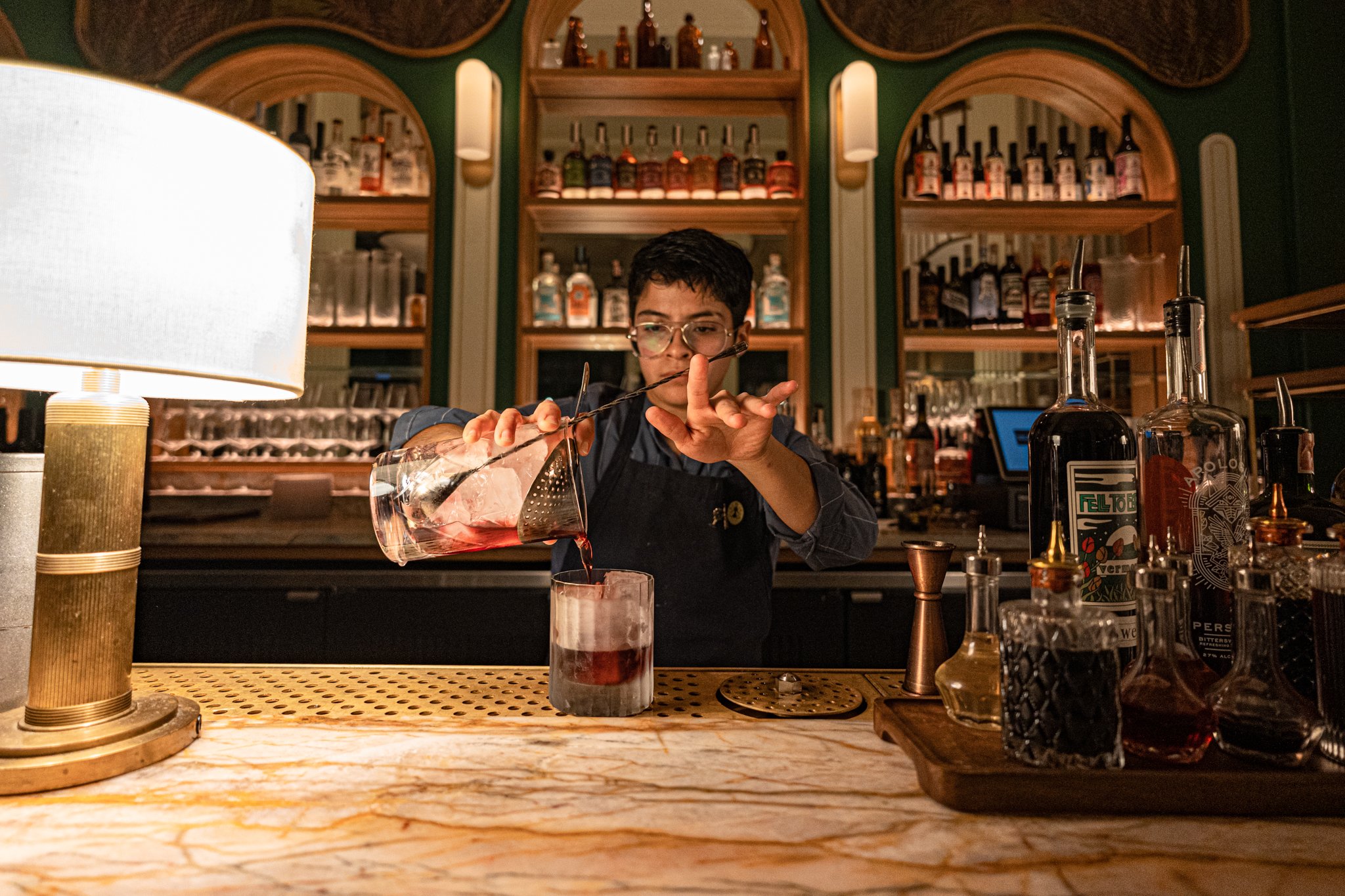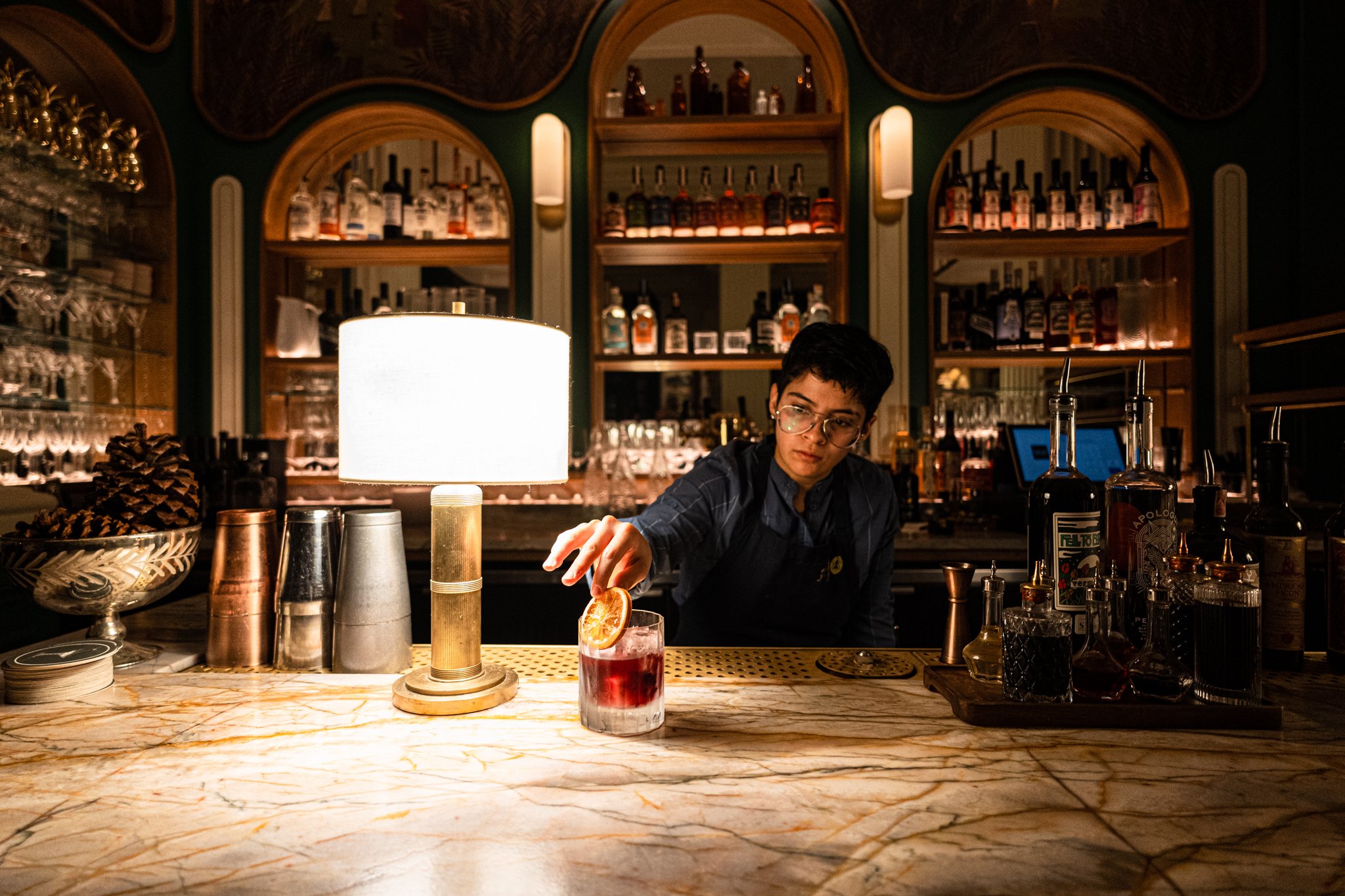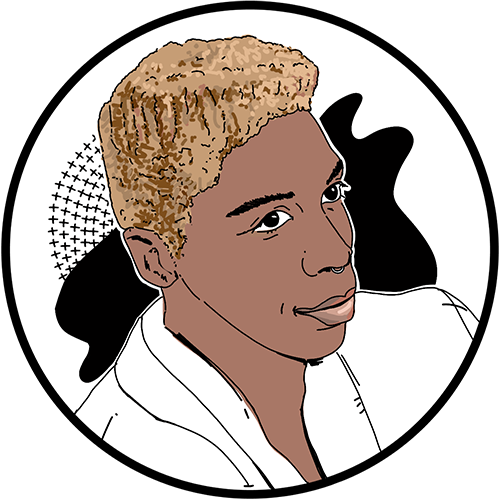Enswell glows like a fistful of jewels, passed down for generations, like it’s always been here, gracing a corner of Spruce Street in Philadelphia’s Center City. Inside, the coffee/cocktail/bottle-shop/fine-dining establishment greets visitors with Parisian globe lamps, a back bar with slender wooden borders and mirrored panels showcasing its many liquor bottles, and a chipped mosaic floor—one of the only elements of Enswell that was part of the original 1917 building design.
It’s all like stepping into a dreamy Art Deco space with hand-painted murals and neoclassical arches, akin to an Alphonse Mucha illustration. I sit down on a tufted leather banquette and glance over the menu, in the mood for a martini. There is one—with the option of Snug Harbor gin or Powderhorn vodka—shaken up with Fell to Earth vermouth, all spirits of Pennsylvanian provenance.
My eyes dart over the wine section, seeking my favorite varietals in anticipation of a follow-up drink to go along with a dinner of skate milanese, pappardelle, and perhaps some roasted bone marrow and littleneck clams. There is one rosé, Discantus, a Cabernet blend from Vox Vineti. The Pinot Noir is a 2020 vintage from Penns Woods. There’s a Pet Nat Blanc from Mural City Cellars. It becomes alarmingly clear that Enswell’s liquors and wines—all more unfamiliar to me than any imported spirits—are all produced and bottled in Pennsylvania.
My heart sinks.
Pennsylvania is known for many things: sports, the Amish, beer, cheesesteaks. We are not exactly famous for our wine.
“The last Pennsylvania wine I had was years ago. It was blue and a slushee. Since then, I’ve harbored some prejudice,” I confess to Enswell’s co-owner, Jonathan Adams, as he decants a bottle of Vox Vineti’s Polyphony, a 2019 blend of Cabernet Franc, Cabernet Sauvignon, and Petit Verdot, aged and bottled about 50 miles west of where I sit.
In many cities around the country, a 100%, local-only beverage program might not seem unusual—especially with a hyperlocal movement afoot in bars and restaurants alike—but in Philadelphia it’s almost unheard of. Philly is largely a BYOB city, and the restaurants that do have the license to serve alcohol typically only offer big brand-name options or esoteric wines from faraway vineyards. How and why did Enswell forge a different path when our state isn’t known for the quality of its homegrown beverages? Turns out, it was a move born out of necessity.
Adams was long considered one of Philadelphia’s best chefs—his resume stretches from New York City to Spain, where he worked at Mugaritz, and back to Philadelphia, where he was executive chef at the now-shuttered, modernist Snackbar and the still-popular Pub & Kitchen. In 2013, he stepped away from the stove (making headlines and shocking those who follow the Philadelphia restaurant scene) to focus on Rival Bros Coffee, a company that has since opened three street-corner cafés in Philly’s tree-lined neighborhoods, and sold many bags of beans for after-dinner menus at our best restaurants.
Nobody ever expected Adams to get back into restaurants. But already, Enswell is, in and of itself, something of an enigma.
As I watch the ruby-colored wine splash into the glass, Adams explains how Enswell’s space was originally a Rival Bros café. Pandemic-era closures prompted a re-evaluation of this strategy–eventually he landed on re-opening the space as Enswell, with coffee by day and cocktails in the evenings. When asked about the local-only beverage list, Adams explains that it was the result of the state’s restrictive liquor licensing laws, and an unexpected loophole he discovered while researching options for implementing a beverage program that would complement the cuisine.
Pennsylvania is a control state, like 16 others in America—which means the government has a monopoly over the wholesale or retail sales of alcohol. The Pennsylvania Liquor Control Board (PLCB) no longer issues new liquor licenses, the quotas of which were census-determined in 1939, to restaurants in Philadelphia. Now, one can only be obtained through transferring an existing license, driving up the price of licenses astronomically, because the seller of the license determines the price.
“It’s basic supply and demand,” says Evan Shingles, a local attorney who represents restaurants (including my own former restaurant, Poi Dog—which did not have a liquor license, given that our opening budget was under $50,000). “The PLCB has not issued new licenses in a long time.”
“Pennsylvania is known for many things: sports, the Amish, beer, cheesesteaks. We are not exactly famous for our wine. ”
Due to this lack of inventory, restaurateurs in Philly pay in the ballpark of $300,000 for a traditional liquor license, including associated fees. By comparison, the cost for a license in neighboring New York City, a much denser urban metropolis, hovers around $4,500. For well-backed projects, a Pennsylvania liquor license is a risky gamble, even counterintuitive. And for most restaurateurs who operate on even slimmer margins, it is simply impossible. This is why Philly is a town filled with excellent BYOBs.
It’s also why, when Adams set out to create Enswell, the restaurant was originally going to be a BYOB. The bulk of its opening budget went toward building out a cocktail den that catapults one into some Gilded Age past, and not toward its liquor license. “I didn’t have $225,000 to spend on getting a liquor license. I could have gotten investors, but I didn’t want to,” says Adams. “Ultimately, it was about being fiscally responsible.”
Shingles often dissuades restaurant owners from applying for liquor licenses for the same reason. Instead, he suggests pursuing a less expensive limited distillery or winery license (an AL or AK), which allows for five satellite locations (also known as “kiosks” in the legal terminology) in addition to the original location—all of which can serve products they ferment or distill in-house in addition to any other products made in-state. “And that’s the key to it all: in-state product,” explains Shingles. “The irony here is, it is far cheaper and easier to make and sell some type of potentially blinding moonshine at five separate locations than it is to sell a Budweiser out of a fridge in your bar.”
Enswell operates on one such limited liquor license, even though the restaurant itself is not a winery or distillery, which explains the enigmatic PA-only selection. “This is hyperspecific to our individual situation,” Adams explains. “We partnered with New Liberty Distillery, which has an allotment of kiosk licenses. New Liberty holds the license, and we essentially operate a tasting room for them. We purchase alcohol directly through them.” Enswell can sell bottles legally, since they are acting on behalf of the distiller, “but we don’t have Campari on the shelf. And there’s no French vermouth.”
This arrangement is unique, and strictly regulated by the PLCB. Anthony Brichta, who serves as the general counsel to the Pennsylvania Distillers Guild, explains: “the PLCB will review any proposed relationship to ensure it is permitted,” emphasizing the importance of compliance and engaging an experienced liquor attorney for restaurateurs seeking a relationship akin to that of Enswell and New Liberty.
One of the only precedents for Enswell’s partnership with New Liberty is the distillery’s previous relationship with Steven Grasse, who created Hendrick’s Gin and then founded the experiential retail space and cocktail bar Art in the Age, which is temporarily closed and now awaiting its own PA distillery license. AITA featured spirits produced by New Liberty in cocktails, along with spirits bottled in Pennsylvania but produced by Grasse’s other distillery in Tamworth, New Hampshire.
“Pennsylvania might be the best state in the country for craft distillers,” declares Grasse. “If I want to sell product to New Jersey or New York, I have to sell to each single store. In Pennsylvania, we have to prove ourselves, but the PLCB will give you ten stores to start out,” he adds. “This is an amazing, liberal policy that benefits the craftsman at the expense of the global behemoth.” And Grasse should know—he’s worked with many of those behemoths, including Diageo, where he managed marketing for Guinness, as well as Tullamore Dew whiskey.
Jared Adkins, owner and master distiller of Phoenixville’s Bluebird Distilling, echoes Grasse. Bluebird’s current portfolio rivals that of New Liberty, with 23 products. Adkins used two of his kiosk licenses to open locations of Char & Stave in Ardmore in March 2022 and Chestnut Hill in September 2023, as cafés during the day and cocktail bars at night. “This is the correct way to do it,” emphasizes Adkins. “Producers like us—we have a distillery, and we are personally using our licenses to expand our distilleries.”
“Alcohol is how people can make money, and it’s being gate-kept.”
But where does that leave establishments that are not associated with distilleries? In the dust, generally. “If I were a restaurateur [it seems unfair],” Grasse says. “I have to pay $300,000 for one license and the distiller gets five?”
Critics like spirits writer and author Lew Bryson echo Grasse’s sentiment. “Simply put, the PLCB is a rogue agency and should have been done away with years ago,” Bryson says, citing example after example of why the system needs a revamp. “The demand for more licenses led to a decision that [unused] licenses could only be kept in escrow for a year, at which time they were returned to the state. The PLCB then sold those licenses. This is shady as hell, in my opinion. The PLCB takes these escrow licenses and sells them for market price.”
Once again, the market price is hundreds of thousands of dollars.
To Bryson, the PLCB currently controls competition more than it does consumption. This plays out in real time on the market: There are currently about 1,300 active liquor licenses in the Philly area (though about 60 of those are assigned to new supermarkets and gas stations permitted to sell liquor). In contrast, there are over 12,600 food establishments. “[The PLCB] has long since stopped serving the citizens, and only serves existing businesses and politicians,” explains Bryson.
“Alcohol is how people can make money, and it’s being gate-kept,” says Ari Miller, who ran Musi, one of Philly’s most celebrated BYOBs until financial difficulties exacerbated by the pandemic forced the restaurant to close. For small independent restaurateurs like Miller (who also happens to be my husband), the opportunity to include a robust wine or cocktail program at a restaurant can be a game-changer because it increases profit margins substantially.
(Today, a profitable restaurant averages a 28%-35% food cost, while the average pour cost for alcohol is 18%-24%. That means the average bar profit margin is 78%-80%, which is much higher than the average food profit margin.)
For Miller, the issue isn’t just personal—it’s about the restaurant community at large and how the PLCB is essentially preventing many businesses from thriving. “How do we make liquor licenses more accessible?” he asks. “How do we make the most vulnerable and most exploited people in our community less exploited, so if they want to open a restaurant and have it profitable, they can?”
Enswell only exists because it finds itself at the center of unique circumstances in Philadelphia and Pennsylvania: Generations-old liquor laws that other restaurants have tried to circumnavigate (or give into) to varying degrees of success. With Enswell’s lead, its model may change not only how PA restaurants operate, but also what customers think about wines and spirits made by their own neighbors.
It’s hard to find shoppers going to a wine store specifically to seek out Pennsylvania wines. And few take the spirits made in our backyard seriously enough to use only those in making cocktails. When setting out to curate the beverage program for Enswell, Adams was similarly faced with the challenge of somehow making these homegrown beverages attractive to Philadelphians.
At first, he experienced the same dread I felt upon seeing the drinks menu. “I’m fucked,” he thought, before seeking out advice from Tim Kweeder of Fell to Earth Vermouth and Bloomsday Café. “I will unfuck you,” Kweeder promised, setting out to guide Adams through a multitude of his favorite PA wines.
Adams also consulted veteran restaurateur Ellen Yin of Fork Restaurant and High Street, who steered him in the direction of wineries like Karamoor (of Blue Bell, Pennsylvania, just north of Philly) and Galen Glen (of Andreas, another 60 miles further north). Although Yin operates establishments with liquor licenses that could conceivably serve wines from anywhere (as long as they are approved by the PLCB), she has glowing praise for local wines. “The hardest part about East Coast wines is convincing East Coast residents to try them,” she says, emphasizing the importance of customer education and the perks of having a well-trained beverage director on staff. “There are some gems. Part of the fun is finding them, and once you do, you will keep supporting them.”
Unlike at Fork, customers at Enswell must choose a Pennsylvania-made option at the restaurant, but the options Adams has assembled are diverse, interesting, and—most importantly—delicious. They also represent a who’s-who of local producers dedicated to confronting climate change, reducing waste, and emphasizing locality.
Take for example Camuna Cellars, a “nontraditional” warehouse winery in Northeast Philly where owner Eli Silins ferments wine, mead, and cider and has even done co-ferments with grapes, pears, and berries sourced from South Jersey, different counties in PA, West Philly, and Bucks County. Silins says he is most interested in fermenting what grows well in these parts and in future, pushing agriculture to become more sustainable while rethinking wine regions in the face of climate change.
At Vox Vineti in Christiana, I caught Ed Lazzerini just as he was about to spend two days straight harvesting and crushing grapes. “I’ve wanted to be a wine grower since I was 15,” he tells me. Originally from New Orleans, he founded Vox Vineti in 2006 and, early on, he hired two French consultants so he could “figure out how to grow French grapes in the mid-Atlantic and tackle a frontier wine region.” Lazzerini explains how the rainfall during the Pennsylvania growing season, combined with its well-draining soil, can shorten the vegetative cycles of all Bordeaux varieties and lengthen their ripening cycles. This makes for “very elegant, food-friendly wines,” he says, adding how he believes that certain parts of Pennsylvania “can be a place that people travel to from all over the world because of the reputation of its wines.”
“We’re celebrating the limitations that we have. It’s not holding us back—it’s giving us parameters.”
Fell to Earth vermouth adds another stop in the closed loop between local winery and Enswell. It’s a pandemic-era project started by Tim Kweeder and Zach Morris, Bloomsday Café’s beverage director and owner, respectively. (An establishment that, incidentally, doesn’t own its liquor license, but rents it as part of its monthly rent). Its first wine was proudly and unabashedly Philly, an iteration labeled “Dumpster Juice.” It was made as a no-waste collaboration with Lazzerini, from a barrel of his Cabernet Sauvignon unfit for bottling, sweetened with local honey and flavored with dandelion, white pine, and herbs that just happened to be growing around the winery.
Camuna Cellars, Vox Vineti, and Fell to Earth represent just a few examples of how the community support fostered by Enswell is palpable in every corner of its sourcing. And Adams’ newfound enthusiasm for challenging preconceived notions about the quality of the region’s wine is infectious. “It excites me to be a vehicle for these producers. I can tell people how good the juice is, because it’s legit,” he says.
The same goes for the cocktail program. “We’re celebrating the limitations that we have. It’s not holding us back—it’s giving us parameters.”
“If someone walks in off the street and says, ‘I want a Negroni …’” I start and trail off.
“I’ll say ‘we don’t have that.’ But I can make them something similar,” Adams replied.
“It’s rare to see this type of limited license used for the development of a true cocktail bar,” reflects Vincent Stipo, owner of wine and cocktail bar Superfolie (a mere fifty paces away from Enswell on Spruce Street), who was brought in to create Pennsylvanian versions of classic cocktails. He welcomed the challenge, though it took a few days to get the recipe for the house Negroni right. “We played around, switched out gins and vermouths, looked at their profiles and body, bitterness, sugars—but I was confident that I could put together an all-PA cocktail list after we went to New Liberty and tasted through every bottle they had.”
The house Negroni features Snug Harbor gin, Fell to Earth sweet vermouth, sour cherry liqueur from New Liberty, and Apologue Persimmon, which has a flavor profile similar to Campari. The latter isn’t made in Pennsylvania, but it is bottled in the state, which is permissible through Pennsylvania’s liquor code under Act 39 of 2016, which states the spirits can be distilled anywhere but must be bottled under a limited-distillery license.
Because of how he’s run his business, Adams has a unique education in all things Pennsylvania alcohol, including being well versed in lesser-known spirits and wines through his unique marriage with New Liberty.
“I’ve learnt how hard it is to convince people [to drink PA wines] from the growers’ perspective. People are very skeptical,” he says. “If I were working for Rothschild, I wouldn’t have to convince anyone. If I were selling Super Tuscans, it would just be a matter of where it goes on the menu.”
I can’t get a Super Tuscan or anything from Rothschild on Enswell’s menu, but the restaurant has opened my eyes to glorious wines produced practically in my backyard. If it weren’t for Enswell, I might never have tried them.
It’s clear that this model has the potential to benefit customers like me, and the system works pretty well for winemakers and distillers in the region, too. Without a full rewriting of the state’s liquor codes, not much is going to change for the community at large, but Enswell is showing us that there is another way. Maybe our restaurateurs don’t have to be beholden to obtaining a traditional liquor license, and maybe they don’t have to source and serve alcohol from all over the world when there are excellent options being produced nearby. And maybe that’s the best we can do for now.
“The BYOB in Philly came into existence because we had a lot of culinary talent who couldn’t afford the barrier of entry to open a restaurant. Yes, real estate is a big expense. But mostly, it’s the liquor license,” Adams said. “This [workaround] is the next evolution of the BYOB.”





















